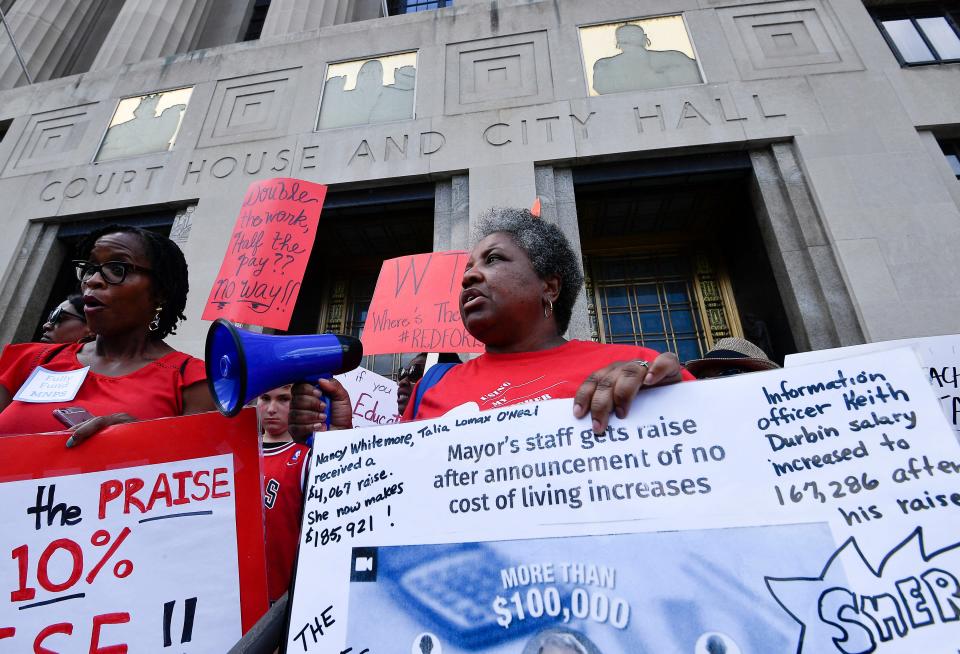Just Askin': Why is Nashville's J.T. Moore Middle School named for a proponent of lynching?
- Oops!Something went wrong.Please try again later.
- Oops!Something went wrong.Please try again later.
Editor's note: You got questions? We got answers. Just Askin' is a Tennessean initiative that answers your burning questions about Nashville and Middle Tennessee. Created by our nosy newsroom of Nashville reporters. Got a Just Askin' question for us? Email justaskin@tennessean.com and your question could appear in an upcoming column
Nashville buildings, bridges, thoroughfares and markers are often named after people that achieve exceptional personal success or make lofty contributions to the community.
John Lewis Way is named after the late civil rights activist and Georgia congressman who helped desegregate Nashville's lunch counters. Diane Nash Plaza honors the prolific Freedom Rider who once asked the mayor if it was wrong to discriminate against people based on their race or skin color. The John Seigenthaler Pedestrian Bridge credits the legendary Tennessee journalist and advocate for racial equality. Dr. Martin L. King Jr. Boulevard is named after the most prominent figure of the Civil Rights Movement.
These namesakes and others enhanced Nashville through advances in the arts, civil rights, politics and other significant areas. Oftentimes, these honors occurred after their deaths, immortalizing their Music City legacies.
"It is a huge honor, probably one of the biggest honors that anyone can get here in Nashville," said local historian David S. Ewing, a ninth-generation Nashvillian.
You got questions. We got answers.
Click to email us at justaskin@tennessean.com, and your question could appear in an upcoming column.
But what happens when society rethinks their past actions? That brings us to today's Just Askin' question about the name adorning a Nashville middle school.
Question: Why is a Nashville public school named after John Trotwood Moore, a Southern apologist and proponent of lynching?
Short answer: Apathy and forgetfulness.
Long answer: To answer this reader-suggested question, we first reached out to a couple of representatives in Metro Nashville Public Schools. Spokesperson Sean Braisted directed us to county historian Carole Bucy. Erin O'Hara Block, the school board member for District 8 where the school is located, directed us back to Braisted.
Bucy was able to put us on the right track. But first, some background on Moore.
'It was overwhelming': The 1994 deadly school shooting that rocked Nashville
Who was John Trotwood Moore?
Moore, a Nashville-based writer and son of a Confederate veteran, collaborated with U.S. Sen. Robert Taylor on the Taylor-Trotwood Magazine from 1906 to 1911.
During this period, a newspaper editor in Brooklyn, New York, criticized racial segregation. Moore defended the practice, calling it a way to keep "buck negroes" from sexually assaulting white women.
In 1919, Moore was named state librarian and archivist by then-Gov. Albert H. Roberts.
Moore was vocal about his racial theories. In 1922, he told Tennessee's superintendent of Public Instruction:
"The South's greatest glory is this, we have twenty million pure blooded anglo-saxon white people. No other country except England herself, can show a greater percent … these people will be the power which will save this republic from anarchy and disunion."

Moore died in 1929, so he's not here to defend his actions.
In 1999, however, the Tennessee Historic Quarterly published "John Trotwood Moore and the Patrician Cult of the New South," a journal article detailing Moore's racial theories.
Fast forward to present day.
J.T. Moore Middle School prides itself on celebrating diversity, displaying compassion and welcoming families from all walks of life. So why is a school that places an emphasis on respecting the dignity of all named after a person who once denied the humanity of 37% of its current students?
The answer could lie with the former owner of the land the school sits on.
50 years later, the name stands
Following the U.S. Supreme Court's landmark decision in 1954 to desegregate public schools, Nashville's public school district embarked on a years-long plan to build new schools across the city. One of those schools was to be located in the Green Hills neighborhood.
In 1967, MNPS purchased property at Arden Place, Moore's former residence, tore down the home and built the middle school. Initially, the school was to be named Green Hills Junior High. Then the Nashville Historical Commission suggested it be named after Moore.
Students then voted, opting to name it John Trotwood Moore Junior High, now known as J.T. Moore Middle School.

The school opened in 1969.
But if the names of original owners determined the names of public institutions, a lot of Nashville government properties would have different names, right?
So we kept digging.
How can Moore be renamed? Or stay the same?
Is politics to blame? Bureaucratic red tape?
Introducing the Tennessee Heritage Protection Act. Enacted in 2013 by the Tennessee Historical Commission, the state law "prohibits the removal, relocation, or renaming of a memorial that is, or is located on, public property."
This includes public schools.
If MNPS wanted Moore renamed, it would need to petition the Tennessee Historical Commission for a waiver. A name change would require a two-thirds vote.
Still, it appears the biggest hurdle in changing the school's name is much simpler.
Learning from the past
While society's thoughts surrounding race and history continue to evolve, is it possible Nashville forgot about Moore's racist past?
Tim Wise thinks so.
Wise, an author, anti-racism educator and activist, said he didn't know anything about the school's namesake when he was a student there in the early 1980s.
"I didn't think twice," said Wise, who attended seventh and eighth grades at Moore. "I don't think any of us did, and I didn't even think about it for all the years that I was doing this work."
It wasn't until a year and a half ago that Wise out of curiosity began researching Moore.
And now that he knows?
Wise said he believes keeping the name sends a message that tradition and continuity are valued over creating multicultural communities.
"What's more important?" he asked rhetorically. "Staying true to tradition for its own sake, or doing right by all the students in the building by having a name that is one that everyone can actually get behind?"
Ewing agrees. He believes the first step toward a potential name change is explaining Moore's past to the masses.
"Sadly most people don't know the person, or anything about the majority of the schools that are named for people here in Nashville," Ewing said. "The school board has a unique opportunity to honor people that deserve such a recognition, as they have done recently … that's the goal if they were to rename the school, let's find a great (person), hopefully a Nashvillian, that deserves that honor."
Diana Leyva covers breaking and trending news for The Tennessean. Connect with her by email at Dleyva@gannett.com or follow her on twitter at @_leyvadiana
This article originally appeared on Nashville Tennessean: Nashville J.T. Moore Middle School is named after a lynching defender

